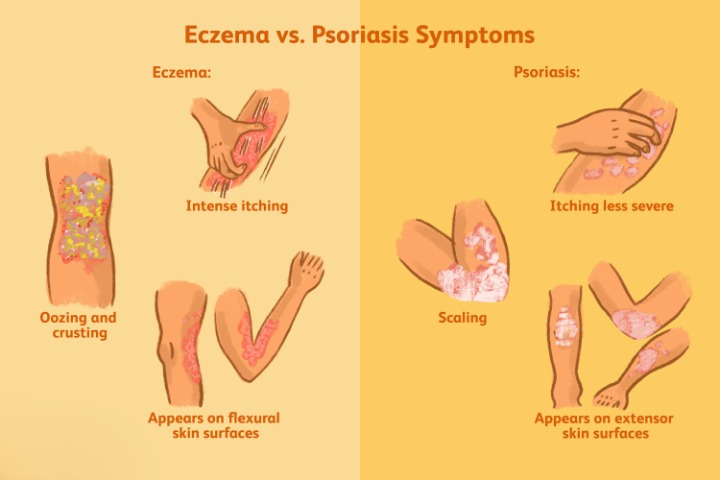Topical medications play a pivotal role in managing both eczema and psoriasis, two chronic skin conditions characterized by inflammation, itching, and skin lesions. These treatments are applied directly to the affected areas of the skin and are designed to reduce inflammation, alleviate symptoms, and promote healing.
Here’s how they are utilized in the treatment of each condition:
Eczema (Atopic Dermatitis):
Eczema is a condition that often begins in childhood but can affect individuals of any age. It is marked by dry, itchy patches of skin that can become red, swollen, and cracked. Topical medications for eczema primarily focus on:
- Moisturization and Barrier Repair: Emollients and moisturizers are essential to hydrate the skin and restore its natural barrier function. They help reduce dryness, itching, and the risk of infection.
- Anti-inflammatory Agents: Topical corticosteroids are commonly prescribed to reduce inflammation and itching during flare-ups. They work by suppressing the immune response and reducing the activity of inflammatory chemicals in the skin.
- Calcineurin Inhibitors: These medications inhibit certain immune responses in the skin and are used as an alternative to steroids, especially in sensitive areas like the face and skin folds.
- Topical Antihistamines and Anti-itch Medications: These can provide relief from intense itching, which is a hallmark symptom of eczema.
- Topical Antibiotics: In cases where eczema lesions become infected, topical antibiotics may be prescribed to treat bacterial infections.
Psoriasis:
Psoriasis is an autoimmune disease that speeds up the growth cycle of skin cells, resulting in thick, scaly patches on the skin’s surface. Topical treatments for psoriasis are crucial for:
- Reducing Inflammation: Corticosteroids and non-steroidal anti-inflammatory drugs (NSAIDs) are used to reduce inflammation, itching, and scaling of psoriatic lesions.
- Slowing Down Skin Cell Growth: Vitamin D analogs and retinoids help normalize skin cell growth and reduce the scaling and plaque formation characteristic of psoriasis.
- Calming the Immune Response: Calcineurin inhibitors, similar to their use in eczema, can help modulate the immune response in psoriatic skin.
- Tar Preparations: Coal tar and pine tar preparations have anti-inflammatory and anti-proliferative effects, which can help alleviate symptoms in mild to moderate psoriasis.
- Moisturizers and Emollients: Regular use of moisturizers can help soothe dry skin and reduce itching, which is beneficial alongside other topical treatments
Considerations:
- Consistency and Compliance: Regular and consistent application of topical medications is crucial for their effectiveness.
- Side Effects: Some topical medications, especially corticosteroids, may cause side effects like thinning of the skin with prolonged use. Patients should follow their doctor’s instructions closely.
- Combination Therapy: In many cases, a combination of topical medications with oral medications or phototherapy (light therapy) may be prescribed for more severe cases of eczema or psoriasis.
In conclusion, topical medications are foundational in the treatment of eczema and psoriasis, providing relief from symptoms, reducing inflammation, and improving the overall quality of life for individuals managing these chronic skin conditions. Their effectiveness depends on proper diagnosis, individualized treatment plans, and consistent patient adherence to prescribed regimens.





Comments